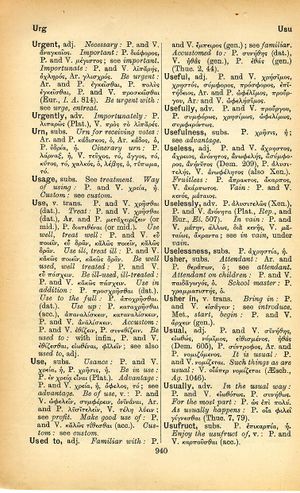use
Βιοῖ γὰρ οὐδείς, ὃν προαιρεῖται βίον → Homo nullus aevum degit arbitri sui → Denn keiner lebt sein Leben, wie er es geplant
English > Greek (Woodhouse)
verb transitive
treat: P. and V. χρῆσθαι (dat.), Ar. and P. μεταχειρίζειν (or mid.), P. διατιθέναι (or mid.).
use well, treat well: P. and V. εὖ ποιεῖν, εὖ δρᾶν, καλῶς ποιεῖν, καλῶς δρᾶν.
use ill, treat ill: P. and V. κακῶς ποιεῖν, κακῶς δρᾶν.
be well used, be well treated: P. and V. εὖ πάσχειν.
be ill-used, ill-treated: P. and V. κακῶς πάσχειν.
use in addition: P. προσχρῆσθαι (dat.).
use to the full: P. ἀποχρῆσθαι. (dat.).
use up: P. καταχρῆσθαι (acc.), ἀπαναλίσκειν, καταναλίσκειν, P. and V. ἀναλίσκειν.
accustom: P. and V. ἐθίζειν, P. συνεθίζειν.
be used to: with infin., P. and V. ἐθίζεσθαι, εἰωθέναι, φιλεῖν; see also used to, adj.
substantive
usance: P. and V. χρεία, ἡ, P. χρῆσις, ἡ.
be in use: P. ἐν χρείᾳ εἶναι (Plato).
advantage: P. and V. χρεία, ἡ, ὄφελος, τό; see advantage.
be of use, v.: P. and V. ὠφελεῖν, συμφέρειν, ὀνινάναι, Ar. and P. λυσιτελεῖν, V. τέλη λύω, τέλη λύειν; use profit.
make good use of: P. and V. καλῶς τίθεσθαι (acc.).

